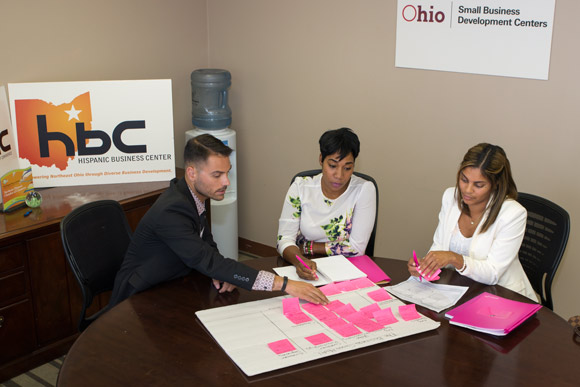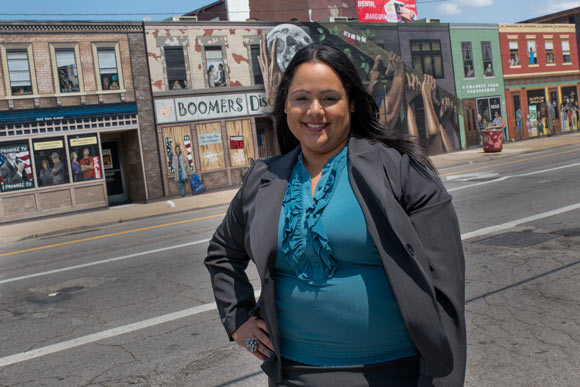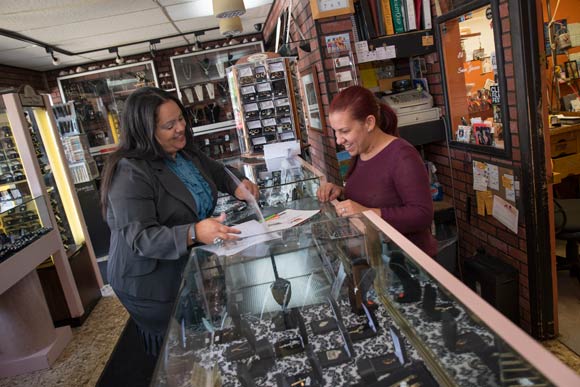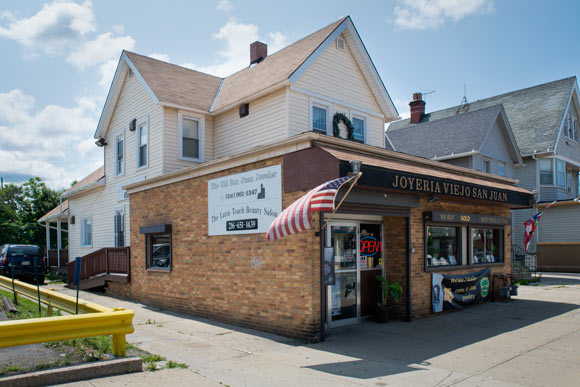what's working: agencies boost prospects of cleveland's rising number of latino entrepreneurs
A 2013 report released by grant-maker the Kaufman Foundation stated that immigrants are twice as likely to start businesses in the U.S. as their native-born brethren. Latinos have become an integral force in that entrepreneurial upswing, effectively doubling their start-up presence nationwide since 1996.
Northeast Ohio has a number of resources available for an expanding Latino populace searching for work and business opportunities. These services, say their providers, can keep immigrant brainpower in the area while acting as a talent magnet for the Latino and Spanish-speaking diaspora.
Skills Pay the Bills
Though there are no reliable stats to determine the percentage of small businesses in Northeast Ohio owned by a Latino, the Northeast Ohio Hispanic Chamber of Commerce (NEOHCC), along with its sister organization, the Hispanic Business Center (HBC), is willing to aid anyone who walks through its doors.
NEOHCC serves as a liaison to the Latino community, matching government agencies and corporations with qualified businesses. Programs focus on increasing profitability and establishing a marketing presence for owners still learning the nuances of identity and presentation.
HBC, under the same roof as the chamber in Cleveland's heavily Hispanic Clark-Fulton neighborhood, coordinates support of businesses through additional economic development programming. The center links entrepreneurs with financing and certification resources, offering counseling and licensing assistance free of charge.
While Hispanic owned small businesses outpace the growth of all other small businesses in the U.S. by a ratio of 3-to-1, such prolific output does not always equal long-term success, says Jenice Contreras, executive director of both NEOHCC and the business center.
Hispanic-owned or not, the majority of start-up enterprises go bust within three years of launch, though not from lack of effort. It's the fundamental business skills that often are found wanting -- so that's what NEOHCC provides.
"We're empowering owners with information," says Contreras. "These can be start-ups, mature businesses, or someone who has an idea and wants to come in and work on their concept."
The organization provides services in Spanish, but will point clients to English-language services should language become a hindrance. The nation's business culture also needs to be learned, Contreras says. Latino entrepreneurs will get into contracts or franchise opportunities without understanding the fine print. NEOHCC ensures owners avoid these pitfalls, while HBC helps them create a solid business plan they can take to potential investors.
Among the partners in this endeavor is Cuyahoga Community College, local home of the Goldman Sachs 10,000 Small Businesses program, a $500 million national initiative that shepherds small companies nationwide through workshops, one-to-one advice, mentoring, capital and networking.
While the Goldman Sachs program does not have a minority focus, it engages in outreach with Latino-run businesses, notes manager Sylvia Rios. One graduate of the Tri-C offering is Viva Spanish, a Cleveland-based provider of Spanish language and cultural programming.
Rios is from a long line of industrious immigrants, including a grandfather who worked at a steel mill in Lorain. She knows the Latino community is out there and ready to work; it's just a matter of reaching them.
"People love Hispanic food, but there's other types of businesses that can bring cultural awareness to Cleveland," says Rios. "The city has unique resources to bring these businesses in."
Overcoming Barriers
Northeast Ohio must be a welcoming environment for new residents, particularly as its immigrant population grows, believes Contreras of NEOHCC.
In Cleveland alone the Hispanic community has increased by nearly 14 percent, according to 2010 U.S. Census data. Groups like Global Cleveland and the Hispanic Alliance create an access point for small business owners putting down roots in a new country, Contreras says.
Hispanic Alliance is an umbrella group that counts both NEOHCC and HBC as members. Not a direct service group, the alliance will send individuals to organizations that fit specific employment needs. For example, folks who require assistance with "soft skills" like job interviewing might be directed to El Barrio, part of The Centers for Families and Children network.
Considering its mission of leadership development and building a visible presence of Hispanics/Latinos in the region, alliance executive director Juan Molina Crespo knows there are barriers that must be broken. Not enough Latinos apply for the jobs available, notes Crespo, and those that do sometimes have difficulty navigating through the online application process. For hopeful entrepreneurs, the complex American system of opening a business can stop them before they ever get started.
"It's more than just hanging out a shingle," says Crespo. "There's criteria that must be adhered to."
Ohio has the goal of awarding 15 percent of state contracts to minority-owned companies, an unwieldy process for those unfamiliar with the terrain. Certification as a Minority Business Enterprise, or MBE, can take twice as long as one for a regular state contract. Though the state has taken steps to streamline the process, the work is far from finished.
"It's about doing what we're doing more efficiently," Crespo says.
The Minority Business Development Agency at Greater Cleveland Partnership is one local entity helping entrepreneurs cut through the MBE thicket. Myra Rosario, owner and president of Latino Cleveland, is busy obtaining her MBE certification while building her online marketing and advertising venture.
Through GCP, Rosario learned how to write contract bids and chase down financing opportunities. "They've been a one-stop shop for me," says the Puerto Rico native. "I was surprised by how much the program offered."
Rosario has a built a brand strong enough to have WKYC Channel 3 as a partner, and is currently working with the network on a Latino-flavored television program she would host. Her burgeoning success proves the buying power of a community that's often underappreciated by outside investors.
"People don't think the Latino market in Cleveland is large enough," says Rosario. "We have strength in numbers."
It Takes a Village
Plans to centralize that economic vitality have been on the docket for years. A Hispanic Village development project two decades in the making might soon see a revival. Dubbed La Villa Hispana by Hispanic Alliance, the proposed business and civic center surrounding W. 25th Street and Clark Avenue would stand as a vibrant hub of Latino identity and business, akin to Cleveland's Asiatown or Little Italy, says alliance director Crespo.
Supporters view Hispanic Village as a destination that would welcome new arrivals while generating jobs and tax revenues. It also could be a symbol of how far Cleveland's Latino workforce has come, and where it still needs to go, Crespo says.
"The cultural value of being Latino is an asset that can contribute to the redevelopment of an entire community," he says.
Photos Bob Perkoski except where noted







